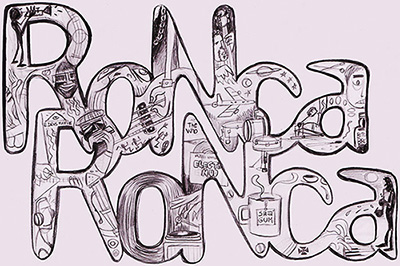
Born in Dumbarton and raised in Clydebank and Cumbernauld, Scotland, Jimmy McCulloch inspired by Django Reinhardt began to play the guitar at the age of 11 and at that age, he made his performance debut as the guitarist for the Jaygars, which was later known as One in a Million. One in a Million performed live in support of The Who during their tour of Scotland in 1967. That year, One in a Million released their “Fredereek Hernando”/”Double Sight” single on MGM. The single is now highly collectable, and an expensive purchase, now classed as a classic and obscure UK psychedelic release. Double Sight, a CD compilation of these and other songs written and recorded by the band, was released in 2009.
In April 1967, McCulloch played lead guitar for the Utterly Incredible, Too Long Ago to Remember, Sometimes Shouting at People during the 14-Hour Technicolour Dream event, which was held on the grounds of the Alexandra Palace in London.[2] That year, he played guitar for One in a Million, which performed live at The Upper Cut and other London venues.
McCulloch first rose to fame in 1969 when he joined Pete Townshend’s friends, Andy ‘Thunderclap’ Newman (piano) and songwriter John ‘Speedy’ Keen (vocals, drums), to form the band Thunderclap Newman. The band enjoyed a UK No. 1 hit with “Something in the Air” that year. Thunderclap Newman’s album, Hollywood Dream, on which McCulloch’s title instrumental then and his song “I See It All” later appeared, sold well but was not as successful as their hit single. From January 1971 until mid-April 1971, the band had toured England, Scotland, Holland, and Scandinavia before they disbanded a couple of weeks later.
In October 1971, McCulloch played guitar in concert with John Mayall and the Bluesbreakers in England and Germany. On 31 October 1971 McCulloch’s band Bent Frame made its performance debut in London. The band subsequently renamed itself the Jimmy McCulloch Band and toured England and Scotland in support of Leslie West’s Mountain in February 1972. By then, McCulloch had done session work for Klaus Voorman, Harry Nilsson, Steve Ellis, John Entwistle, and others.
In June 1972, McCulloch joined the blues rock band (and fellow Mayall-school alumni) Stone the Crows to replace guitarist Les Harvey, who had been electrocuted on stage. McCulloch helped Stone the Crows to complete their Ontinuous Performance album by playing on the tracks “Sunset Cowboy” and “Good Time Girl”. Stone the Crows disbanded in June 1973.
In 1973, McCulloch played guitar on John Keen’s album, Previous Convictions, had a brief stint in Blue and he played guitar on Brian Joseph Friel‘s debut album under the pseudonym ‘The Phantom’.
McCulloch joined Wings in August 1974. His debut track with them was “Junior’s Farm“.
McCulloch composed the music score of the anti-drug song “Medicine Jar” on Wings’ Venus and Mars album and the similar “Wino Junko” on the band’s Wings at the Speed of Sound album. He also sang both. Colin Allen, former drummer for Stone the Crows, wrote the lyrics of both songs.
During his time with Wings, McCulloch formed White Line with his brother Jack on drums and Dave Clarke on bass, keyboards and vocals. They played several impromptu gigs and released a single, “Call My Name”/”Too Many Miles”. A 13-track album, White Line – Complete, was released in 1994 on Clarke’s Mouse Records.[3] Jimmy McCulloch and White Line had appeared on the British TV programme Supersonic on 27 November 1976. In addition, McCulloch recorded and produced two unreleased songs by The Khyber Trifles and had occasionally performed live (in London and their native Glasgow) with the band. Finally, as noted above, he played guitar on Roy Harper’s album, Bullinamingvase, and Ricci Martin’s album, Beached, in 1977.
In September 1977, McCulloch left Wings to join the reformed Small Faces during the latter band’s nine date tour of England that month. He played guitar on the Small Faces’ album, 78 in the Shade. In early 1978, McCulloch started a band called Wild Horses with Brian Robertson, Jimmy Bain and Kenney Jones, but both McCulloch and Jones left the band soon afterward. In 1979, McCulloch joined the Dukes. His last recorded song, “Heartbreaker”, appeared on their only album, The Dukes.
A melodic, heavily blues-infused guitarist, McCulloch normally used a Gibson SG and a Gibson Les Paul, and he occasionally played bass when McCartney was playing piano or acoustic guitar.
On 27 September 1979, McCulloch was found dead by his brother in his flat in Maida Vale, London.[4] An autopsy found that McCulloch died of heart failure due to morphine and alcohol poisoning.[5] He was 26 years old but was not known for being a user of hard drugs.[6]
